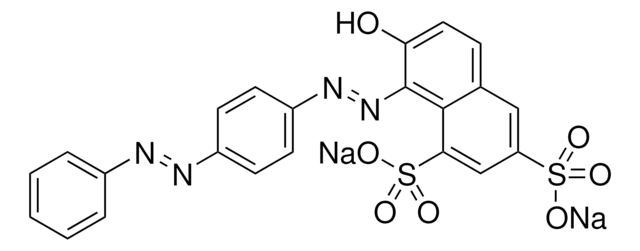87613
Erythrosin B
analytical standard
Synonyme(s) :
Erythrosin extra bluish, 2′,4′,5′,7′-Tetraiodofluorescein disodium salt, Acid Red 51, Iodoeosin
About This Item
Produits recommandés
Qualité
analytical standard
Niveau de qualité
Pureté
≥98.0% (HPLC)
Technique(s)
HPLC: suitable
gas chromatography (GC): suitable
Application(s)
cleaning products
cosmetics
food and beverages
personal care
Format
neat
Chaîne SMILES
[Na+].[Na+].[O-]c1c(I)cc2c(Oc3c(I)c([O-])c(I)cc3C24OC(=O)c5ccccc45)c1I
InChI
1S/C20H8I4O5.2Na/c21-11-5-9-17(13(23)15(11)25)28-18-10(6-12(22)16(26)14(18)24)20(9)8-4-2-1-3-7(8)19(27)29-20;;/h1-6,25-26H;;/q;2*+1/p-2
Clé InChI
RAGZEDHHTPQLAI-UHFFFAOYSA-L
Vous recherchez des produits similaires ? Visite Guide de comparaison des produits
Application
Conditionnement
Mention d'avertissement
Warning
Mentions de danger
Conseils de prudence
Classification des risques
Acute Tox. 4 Oral - Aquatic Chronic 2
Code de la classe de stockage
11 - Combustible Solids
Classe de danger pour l'eau (WGK)
WGK 1
Point d'éclair (°F)
359.6 °F - closed cup
Point d'éclair (°C)
182 °C - closed cup
Choose from one of the most recent versions:
Certificats d'analyse (COA)
Don't see the Right Version?
If you require a particular version, you can look up a specific certificate by the Lot or Batch number.
Déjà en possession de ce produit ?
Retrouvez la documentation relative aux produits que vous avez récemment achetés dans la Bibliothèque de documents.
Les clients ont également consulté
Notre équipe de scientifiques dispose d'une expérience dans tous les secteurs de la recherche, notamment en sciences de la vie, science des matériaux, synthèse chimique, chromatographie, analyse et dans de nombreux autres domaines..
Contacter notre Service technique














